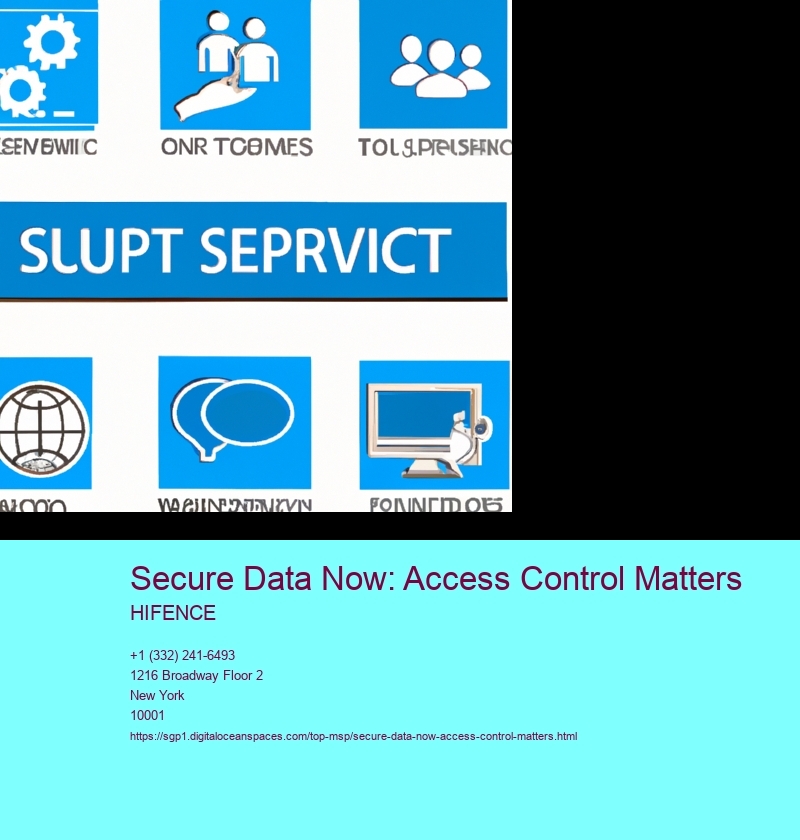Secure Data Now: Access Control Matters
managed service new york
Understanding Data Security Risks and Vulnerabilities
Okay, so, listen up, when were talking "Secure Data Now: Access Control Matters," we gotta first understand the bad stuff, right? I mean, like, what are the darn risks and vulnerabilities that are just waiting to pounce on your precious data?
It aint just about some hacker in a dark room (though thats definitely a thing). A risk could be anything that could lead to your data being compromised. Think about it: a disgruntled employee, a lost laptop, or even just a plain ol human error. See? Its not always some super-complicated cyberattack.
Vulnerabilities, on the other hand, are like weaknesses in your systems armor. Say your software is outdated. Thats a vulnerability! Or, like, if your passwords are all "password123," thats a major, major vulnerability. managed services new york city We cant let that happen. Its like leaving your front door wide open, isnt it?
We shouldnt ignore the fact that people (yes, even you) are a big part of the problem, arent they? Phishing scams, social engineering... these things work because they exploit human trust, not necessarily some technical flaw. It's not that we are all inherently untrustworthy, but we need to be careful.
The point is, you cant really protect your data if you dont know what youre protecting it from. You gotta identify those risks and vulnerabilities, assess how likely they are to happen, and consider what the impact would be if they did happen. Then (and only then!) can you put proper access controls in place. And those access controls, well, thats a whole other story (but a super important one, I tellya!). Gosh!
The Importance of Access Control in Data Protection
Secure Data Now: Access Control Matters

Alright, lets talk about keepin our data safe, yeah? I mean, in todays world, its practically a battlefield out there, with threats lurkin around every corner. But one thing, its not talked about enough is access control. (And thats a real shame, yknow?)
Think of it this way: your data is like a treasure chest. It wouldnt be smart, would it, to just leave it open for anyone to rummage through? Access control, in essence, is the lock on that chest. Its the system that determines who gets to see what, who gets to change what and who gets to, uh, delete what. Its not just a nice-to-have; it is a fundamental component of any solid data protection strategy.
Without robust access control, you are practically beggin for trouble. Imagine a low level employee accidentally stumbling upon sensitive financial records (or worse, someones social security information, eek!) and, well, thats a data breach waitin to happen. Or, consider a disgruntled employee intentionally causing damage cause they have unrestricted access. No, thank you! Access controls prevent these kinds of scenarios.
Effective access control shouldnt be a one-size-fits-all approach. It must be tailored to the specific needs and risks of your organization. This means implementin different levels of access based on job roles, responsibilities, and the sensitivity of the data. It may involve two-factor authentication (because passwords alone arent gonna cut it anymore, are they?), role-based access control, and regular audits to ensure everything is workin as it should.
Furthermore, it aint sufficient to just set it and forget it. Access control is a continuous process. As people join, leave, or change roles within the company, their access permissions must be updated accordingly. Neglecting this aspect can create vulnerabilities that can be exploited.
So, there you have it. Access control; it is not just a technical detail. Its a critical aspect of data protection. Its about safeguarding your information, maintaining compliance, and protecting your reputation. Its a must have! Yikes! Its time we started takin it seriously.

Types of Access Control Models: A Comparative Analysis
Access control, huh? It aint just about keeping folks outta places they shouldnt be. Its a whole system, a dance of permissions and restrictions. And the way we orchestrate that dance? Thats where access control models come in. Think of them as different rulebooks or blueprints for how we decide who gets to see what, do what, and when.
Now, there are a bunch of these models, each with its own strengths and, well, weaknesses. One of the biggies is Discretionary Access Control (DAC). Its pretty simple: the data owner (the person who created the file or resource) gets to decide who has access. Its like having a personal bouncer for your stuff (sort of). But, and this is a big but, its not always the most secure. Why? Because the owner might not always make the best decisions, or they could accidentally grant too much access. Security isnt guaranteed, is it?
Then theres Mandatory Access Control (MAC). This ones the opposite of DAC. Instead of individuals deciding, a central authority (like the government, or a security administrator) sets the rules.
Secure Data Now: Access Control Matters - check
- managed service new york
Role-Based Access Control (RBAC) is another popular model. Here, access is granted based on a users role within an organization. Sales folks get access to sales data, engineers get access to engineering data, and so on. Its efficient and easier to manage than MAC, but, you know, it relies on roles being well-defined and kept up-to-date. If roles arent accurate, access control fails, doesnt it?
Attribute-Based Access Control (ABAC), is (gasp!) a bit more complex. Instead of relying solely on roles, ABAC uses a whole bunch of attributes – user attributes, resource attributes, environmental attributes – to make access decisions. Location, time of day, device type, you name it. Its incredibly flexible, but it aint a walk in the park to implement or manage. Complicated, you see.

So, which model is best? Well, it depends. There isnt a one-size-fits-all answer (duh!). The right model for you depends on your specific needs and security requirements. But understanding these different models is absolutely crucial for securing your data. Access control matters, after all!
Implementing Robust Access Control Policies and Procedures
Secure Data Now: Access Control Matters
Alright, so lets talk about keeping your data safe, huh? (I mean, really safe!).
Secure Data Now: Access Control Matters - check
- managed service new york
- managed services new york city
- managed it security services provider
- managed service new york
- managed services new york city
- managed it security services provider
- managed service new york
- managed services new york city
- managed it security services provider
Access control, simply put, is deciding who gets to see what. It aint just about slapping a password on everything (though thats a start, I guess). Were talking layers, people, layers! Think of it like a really complicated onion, but instead of making you cry, it... well, it keeps hackers out.
You gotta have policies. These arent just suggestions; theyre the rules. Who needs access to customer info? What about financial records? Not everyone needs to see everything, understand? And these policies, they cant be vague. "Oh, give Bob access if he really needs it" doesnt fly, not anymore. Be specific!

Then theres the procedures. Okay, great, you have a policy saying only authorized personnel can view sensitive data. But how do you actually enforce that? Is there a system for requesting access? check Is there some approval workflow? Is there regular auditing to see if people are looking where they shouldnt? Uh oh!. check You really need to consider all of that.
And, (this is crucial), its not a one-time thing, you know. Things change. People leave (sadly). New systems get implemented.
Secure Data Now: Access Control Matters - managed services new york city
Neglecting this stuff? Well, dont. Data breaches can be devastating. Its not just about the money (though thats a big part), its about trust. Once thats gone, its hard to get back.
So, yeah, access control matters.
Secure Data Now: Access Control Matters - managed it security services provider
- managed services new york city
- managed services new york city
- managed services new york city
- managed services new york city
- managed services new york city
- managed services new york city
- managed services new york city
- managed services new york city
- managed services new york city
- managed services new york city
- managed services new york city
- managed services new york city
- managed services new york city
- managed services new york city
Best Practices for User Authentication and Authorization
Okay, so, like, Secure Data Now? It all boils down to who gets to see what, right? Access control aint just some nerdy IT thing, its absolutely crucial. And when were talkin user authentication and authorization, well, thats the front door to your data fortress.
Best practices? Theres a bunch, but lets hit the high notes. First, authentication needs to be strong. I mean, really strong. Passwords? (Ugh, I hate passwords) Theyre, like, so last decade. Multi-factor authentication (MFA) is the way to go. Its not optional anymore, its mandatory. Think of it as a bouncer at a club: you need more than just a fake ID to get in. managed it security services provider If you arent using MFA, youre leaving the door open, plain and simple.
Authorization, on the other hand, is about permission. Just cause someones authenticated (theyre inside the club), doesnt mean they can, like, raid the VIP room or mess with the DJs equipment. Least privilege is key here. Give users the minimum access they need to do their jobs. Dont just throw keys to the kingdom around, OK? If someone doesnt require admin access, then dont give it to them! Simple.
And we cant forget about regular reviews. User roles change, projects end, people move on.
Secure Data Now: Access Control Matters - managed services new york city
- managed it security services provider
- managed services new york city
- managed it security services provider
- managed services new york city
- managed it security services provider
- managed services new york city
- managed it security services provider
- managed services new york city
- managed it security services provider
- managed services new york city
- managed it security services provider
- managed services new york city
Finally – and this is kinda obvious, but people forget – never store passwords in plain text. Thats a huge no-no. Hash em, salt em, do whatever you gotta do, but dont leave em lying around for everyone to see.
Secure Data Now: Access Control Matters - managed service new york
- check
- check
- check
- check
- check
- check
So, yeah, thats the gist of it. Strong authentication, least privilege authorization, regular reviews, and proper password storage. Follow these, and youll be in way better shape. It aint rocket science, but it does require some attention to detail. Get it right, and your data will thank you. Well, metaphorically, anyway.
Monitoring and Auditing Access Control Systems
Okay, so, Access Control Matters, right? managed service new york And one crucial, but often overlooked, bit is monitoring and auditing those access control systems. Think about it, you cant just set up a fancy door with a retina scanner (or whatever) and then forget about it! Its gotta be more involved.
Monitorings kinda like keeping an eye on things in real-time. Whos trying to get in? Are there weird login attempts happening at 3 AM? Is someone suddenly accessing files they usually dont? You want alerts for anything that seems, well, off. And it shouldnt be a case of "oh, the system just magically knows," but rather that youve defined what "off" is.
Auditing, on the other hand, thats more like a detective looking back at what has happened. It aint about stopping the bad stuff as it happens, but rather uncovering any shenanigans that might've slipped through the cracks. Were talking about logs, logs, and more logs! Who accessed what, when, and why? Did they really need that data? This is how you find out if someones been snooping around where they shouldnt have been. It aint something you can ignore!
Now, these things arent separate, yknow? They work together. Monitoring flags a suspicious event, and the audit trail helps you figure out if it was a legit thing or something more nefarious. And gosh, you dont want to be caught with your pants down if an auditor comes calling and you cant prove your access controls are actually working.
Ignoring this stuff?
Secure Data Now: Access Control Matters - managed service new york
- managed it security services provider
- managed services new york city
- check
- managed it security services provider
- managed services new york city
- check
- managed it security services provider
- managed services new york city
- check
The Future of Access Control: Emerging Technologies
Okay, so, like, access control. Not exactly the sexiest topic, is it? managed it security services provider But hold on a sec! Its actually kinda crucial, especially when were talking "Secure Data Now." Think about it. All the fancy encryption in the world doesnt mean squat if some random dude can just waltz in and grab whatever he wants, right?
The future of access control? It aint just about passwords and keycards anymore. Were talking emerging tech, people! Biometrics, for one. Your fingerprint, your face, even your voice – these are becoming the new keys. And Im not just talking about unlocking your phone! Were seeing it in buildings, data centers (places you definitely dont want unauthorized people), and even online systems.
Then theres behavioral biometrics. This is where it gets really interesting, (and a little creepy, maybe?). Its not just who you are, but how you act. The way you type, how you move your mouse, how you interact with systems. If somethings off, the system flags it. Pretty slick, huh?
And dont forget about context-aware access control. This isnt a system that ignores where you are or what you are trying to do. It considers your location, the time of day, your role within an organization, and a whole bunch of other factors before granting access. Like, if youre trying to access sensitive financial data at 3 AM from a coffee shop in Vladivostok, its probably gonna raise some eyebrows, wouldnt you think?
Now, are there downsides to all this fancy tech? You betcha! Privacy concerns are huge. (Who wants their every move monitored, am I right?). And security risks, ironically! If someone manages to spoof your biometric data, youre toast. So, its not like its a perfect, foolproof solution.
But hey, the key thing is that access control is evolving. It must change. We cant just rely on the same old methods when the threats are getting more sophisticated all the time. The future? Its about smarter, more adaptive, and more secure systems that, uh, hopefully, keeps the bad guys out. And thats what matters.
